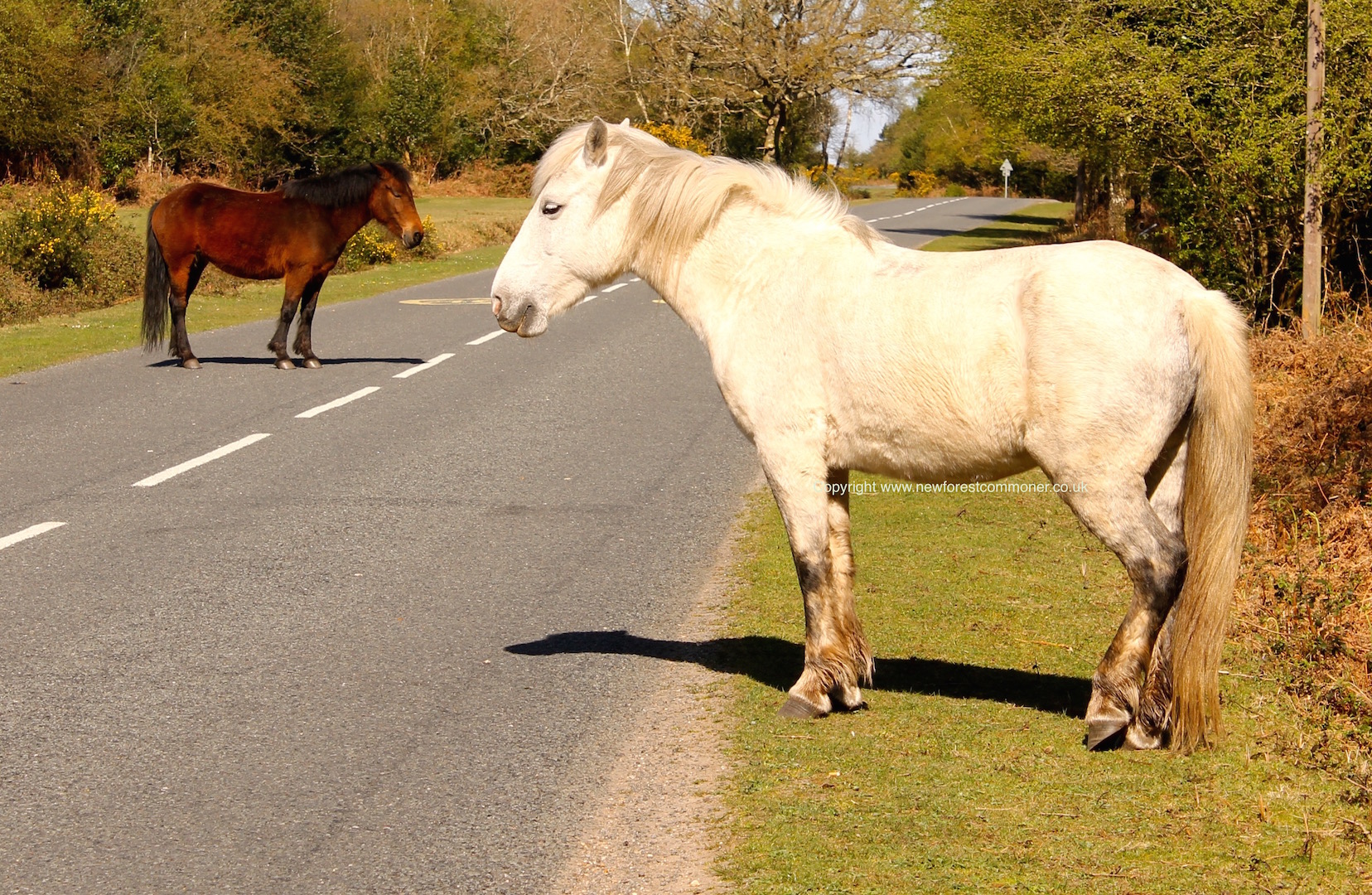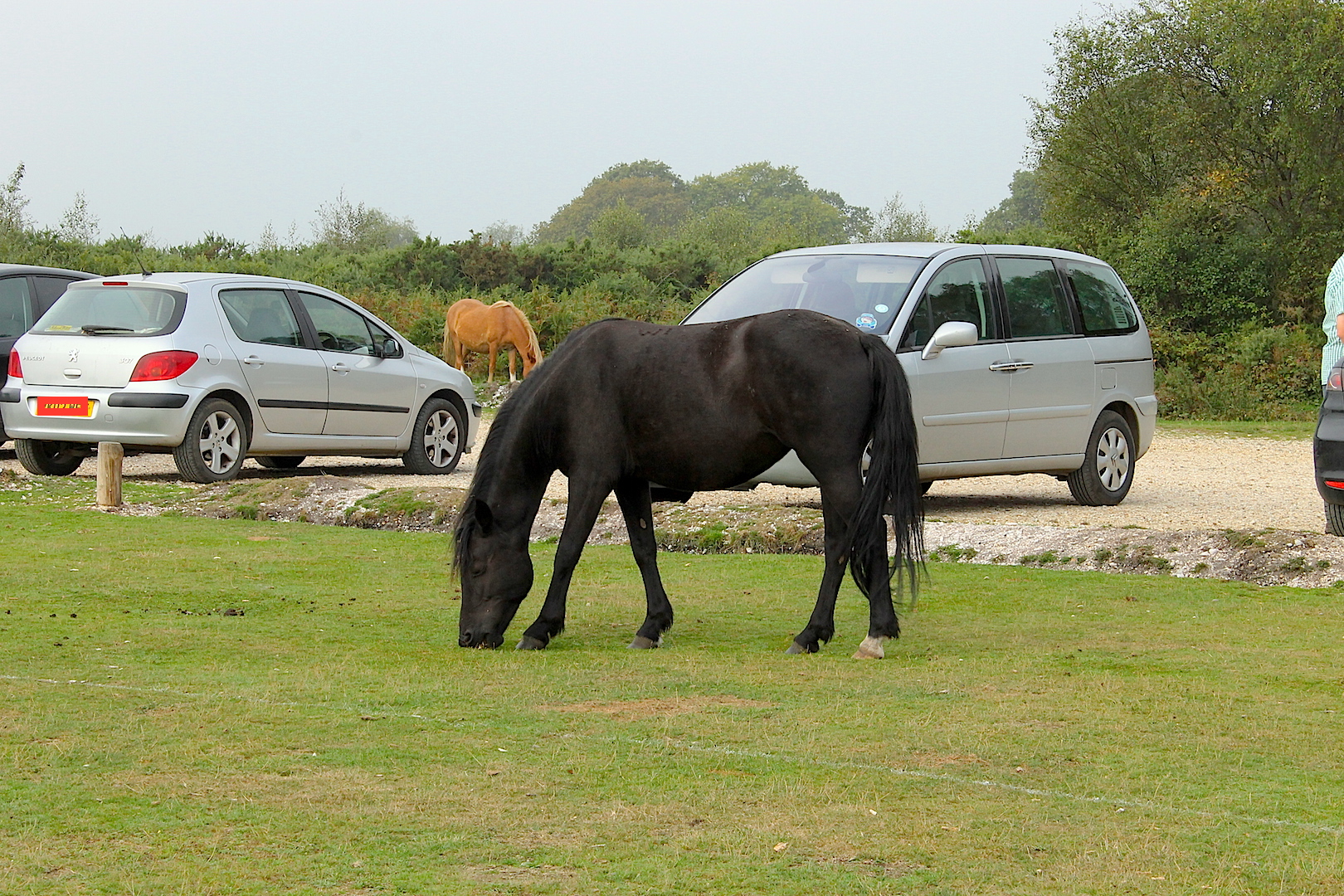
The free-roaming ponies use the New Forest road system at all times of the year, day and night.
When travelling across the New Forest have you ever wondered why the free-roaming ponies will cross the road in front of you, even if they have seen you coming? Their hearing is excellent and they have good all-round binocular vision, even when grazing. Their night-vision is also good too. So, it isn’t because they are unaware of your presence. There’s obviously something else causing this behaviour and it’s all to do with the way their brains function. We, as human beings, are able to conceptualise and anticipate a problem in advance and adapt our behaviour to influence the outcome, but ponies cannot. A pony is not able to perform any feats of logical interpretation or abstract thought. They do not have the ability to rationalise their actions or have any sense of future events. The emotion they are feeling at that particular time will determine how they behave. If the grass looks greener over the other side of the carriageway, or if they want to go and join a herd-mate, then they will cross the road whether you are there or not. They live only in the moment and for the immediate satisfaction of their needs.
Predator and prey – life, the universe and everything!
New Forest ponies, like all equines, are a prey species and much of their mental processing capacity will involve identifying and avoiding ancestral predator enemies, such as wolves. (Yes, we know there are no wolves on the New Forest but the pony’s instinctive reactions haven’t quite worked that out yet!) Their brain function is hard-wired to react quickly – conscious thought takes too long to process – and the fight or flight mode is constantly ticking along in the background. It may seem obvious to say, but ponies only run away from things that frighten or threaten them. Cars are not an ancient predator species and the ponies are not afraid of them. The equine brain size is not, as some maintain, the size of a walnut but is actually fairly large. Most of its function though is busy operating the pony’s acute senses, avoiding predators, controlling the speed and direction of its feet, analysing the body language of other animals (including people), and searching for food, water and shelter, for example. With all this survival activity going on in the brain there is very little room for them to ponder life the universe and everything!
Memory and learning ability
However, the free-roaming New Forest ponies do have very efficient memories and learning ability. This is a basic necessity for surviving on a large open range where there are a variety of habitats and resources. The ability to remember where to find food, water and shelter, especially when times are hard, is essential. Many free-roaming New Forest ponies remember where ‘home’ is and will often make regular return trips to their commoning owner’s holding, sometimes just to check-in. Much of this territory mapping knowledge, along with further life skills, is learned from their mothers and other herd-members. To domesticate and train a horse or a pony we manipulate its learning and memory skills, with positive reinforcement, and overcome their natural fears using a mixture of persistence, repetition and reward. Only when the unusual becomes mundane, such as a having a rider on its back, or an object of fright becomes a familiar aspect of their environment, will the animal accept it. This explains why the New Forest ponies are seemingly content to graze close to the roadsides, even during busy periods of traffic. Not only are they unafraid of vehicular traffic, because it is a regular feature of their daily lives, but the visitors who feed them from their cars, in the car parks or on the verges are positively training them to accept and remember vehicles as friendly allies.
Bibliography:
Waring, George. H: Horse Behaviour: The Behavioural Traits and Adaptions of Domestic and Wild Horses, Including Ponies. (1983)
Budiansky, Stephen: The Nature of Horses. (1998)
Gill, Elaine: Ponies in the Wild. (1994)
Weston, Sarah: No Fear, No Force: A guide to handling and training unhanded and semi-feral foals in an ethical and gentle way. (2009)



You must be logged in to post a comment.